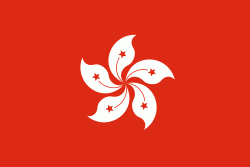Hong Kong dollar
$
The Hong Kong dollar (, sign: HK$; code: HKD) is the official currency of the Hong Kong Special Administrative Region. It is subdivided into 100 cents or 1000 mils. The Hong Kong Monetary Authority is the monetary authority of Hong Kong and the Hong Kong dollar.Three commercial banks are licensed by the Hong Kong Monetary Authority to issue their own banknotes for general circulation in Hong Kong. These banks, HSBC, Bank of China, and Standard Chartered, issue their own designs of banknotes in denominations of HK$20, HK$50, HK$100, HK$150, HK$500, and HK$1000, with all designs being similar to one another in the same denomination of banknote. However, the HK$10 banknote and all coins are issued by the Government of Hong Kong.
As of April 2019, the Hong Kong dollar is the ninth most traded currency in the world. Hong Kong uses a linked exchange rate system, trading since May 2005 in the range US$1:HK$7.75–7.85.
Apart from its use in Hong Kong, the Hong Kong dollar is also used in neighbouring Macau. It is pegged at 1 Hong Kong dollar to 1.03 Macanese patacas, and is generally accepted at par or MOP 1.00 for retail purchases.
When Hong Kong was established as a free trading port in 1841, there was no local currency in everyday circulation. Foreign currencies such as Indian rupees, Spanish or Mexican 8 reales, and Chinese cash coins circulated. Since 1825, it had been the policy of the British government to introduce sterling silver coinage to all of its colonies, and to this end, in 1845 the Spanish or Mexican 8 reales coins were set at a legal tender value of 4 shillings, 2 pence sterling (50 pence). But just as in the case of the British North American colonies, the attempts to introduce the sterling coinage failed to overcome the strong local adherence to the silver Spanish dollar system that had been in wide circulation across the Far East, emanating for centuries from Manila in the Philippines as part of the Spanish East Indies in the Spanish colonial empire through the Manila-Acapulco Galleon Trade with the coins minted in the Spanish Americas in Mexico or Peru or Bolivia.
By 1858, the British government gave up all attempts to influence the currency situation in Canada, and by the 1860s it came to the same realisation in Hong Kong: that there was no point in trying to displace an already existing currency system. In 1863, the Royal Mint in London began issuing special subsidiary coinage for use in Hong Kong within the dollar system, though other national currencies circulated unofficially for years afterwards. In 1866, a local mint was established at Cleveland Street in Causeway Bay on Hong Kong Island for the purpose of minting Hong Kong silver dollar and half dollar coins of the same value and similar likeness to their Spanish/Mexican counterparts. The Chinese did not however receive these new Hong Kong dollars well, and in 1868 the Hong Kong Mint was closed down with a loss of $440,000. The machinery at the Hong Kong mint was sold first to Jardine Matheson and in turn to the Japanese and used to make the first Yen coins in 1870. In the 1860s, banknotes of the new British colonial banks, the Hong Kong and Shanghai Banking Corporation and the Chartered Bank of India, Australia and China, denominated in dollars, also began to circulate in both Hong Kong and the wider region.
In 1873, the international silver crisis resulted in a devaluation of silver against gold-based currencies. Since the silver dollars in the US and Canada were attached to a gold exchange standard, this meant that the silver dollars circulating along the China coast dropped in value as compared to the U.S. dollar and the Canadian dollar.
Country
-
Hk
Hong Kong ( or ;, Cantonese: ), officially the Hong Kong Special Administrative Region of the People's Republic of China (abbr. Hong Kong SAR or HKSAR), is a city and special administrative region of China on the eastern Pearl River Delta in South China. With 7.5 million residents of various nationalities in a 1104 km2 territory, Hong Kong is one of the most densely populated places in the world. Hong Kong is also a major global financial centre and one of the most developed cities in the world.
Hong Kong was established as a colony of the British Empire after the Qing Empire ceded Hong Kong Island from Xin'an County at the end of the First Opium War in 1841 then again in 1842. The colony expanded to the Kowloon Peninsula in 1860 after the Second Opium War and was further extended when Britain obtained a 99-year lease of the New Territories in 1898. British Hong Kong was occupied by Imperial Japan from 1941 to 1945 during World War II; British administration resumed after the surrender of Japan. The whole territory was transferred to China in 1997. As one of China's two special administrative regions (the other being Macau), Hong Kong maintains separate governing and economic systems from that of mainland China under the principle of "one country, two systems".
